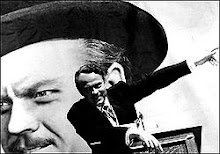The Oscar (1966, Russell Rouse) *
 Pure pulp all the way. Stephen
Boyd plays a rough around the edges hardscrabble guy who makes his way in
Hollywood (by way of peddling a strip tease act) stereotypically using and
crushing everyone he meets until he gets all the way to the top and is
nominated for an Oscar. The movie plays out in a series of flashbacks told by
various characters the night of the Academy Awards. (Who can resist dialog
like, “Man, he wanted to swallow Hollywood like a cat with a
canary. And he did it! The parts got bigger, and Frankie was hooked! Like a
junkie shooting pure quicksilver into his veins, Frankie got turned on by the
wildest narcotic known to man: success! The parts got bigger and bigger...
Frankie got hungrier and hungrier.) Will Stephen Boyd (Frank Fane is
the name of his character, best line “When you tell it straight
you don't do any polka, do you?) win the AA
for Best Actor?. A second tier
star-studded cast abounds Jill St. John, Elke Sommer, Tony Bennett (in his one
and only theatrical as Hymie Kelly), Milton Berle (plays his agent, all too
chillingly), Eleanor Parker and Ernest Borgnine (none of whom are Oscar caliber
here, but Ernie’s the best). A raft of guest stars in the character parts
Pure pulp all the way. Stephen
Boyd plays a rough around the edges hardscrabble guy who makes his way in
Hollywood (by way of peddling a strip tease act) stereotypically using and
crushing everyone he meets until he gets all the way to the top and is
nominated for an Oscar. The movie plays out in a series of flashbacks told by
various characters the night of the Academy Awards. (Who can resist dialog
like, “Man, he wanted to swallow Hollywood like a cat with a
canary. And he did it! The parts got bigger, and Frankie was hooked! Like a
junkie shooting pure quicksilver into his veins, Frankie got turned on by the
wildest narcotic known to man: success! The parts got bigger and bigger...
Frankie got hungrier and hungrier.) Will Stephen Boyd (Frank Fane is
the name of his character, best line “When you tell it straight
you don't do any polka, do you?) win the AA
for Best Actor?. A second tier
star-studded cast abounds Jill St. John, Elke Sommer, Tony Bennett (in his one
and only theatrical as Hymie Kelly), Milton Berle (plays his agent, all too
chillingly), Eleanor Parker and Ernest Borgnine (none of whom are Oscar caliber
here, but Ernie’s the best). A raft of guest stars in the character parts like Joseph Cotton, Ed Begly, Walter Brennan and Broadrick Crawford. The best is Peter Lawford who plays a actor much like he was in 1966; a guy who had been in pictures a long time and had lost the juice after his precieved – his performance is eerily prescient. In Lawford's case he crossed Frank Sinatra (or at least Frank thought he did). And while fine actors all this is far from their best work. As bad as it is, it passes the time and is fun as a ‘time capsule’. Think of it as a poor man’s Valley of the Dolls; even soapier. (“You lie down with pigs you end up smelling like garbage.”) Stephen Boyd is as one-dimensional as he was as Ben-Hur. It’s a long movie and the story is told in as ‘ploddingly’ of fashion as a Harold Robbins novel.

